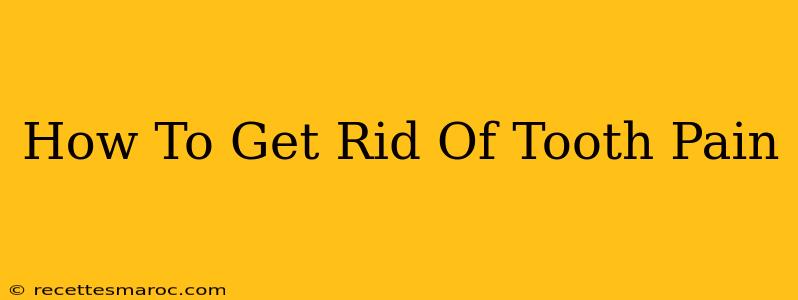Tooth pain is a common problem that can range from a mild ache to a severe throbbing sensation. It can disrupt your daily life, making it difficult to eat, sleep, and concentrate. While a dentist is the ultimate authority on diagnosing and treating tooth pain, there are several things you can do at home to find relief until you can get professional help. This guide will explore effective home remedies and explain when it's crucial to seek immediate dental care.
Understanding the Causes of Tooth Pain
Before exploring solutions, let's briefly examine why your teeth might be hurting. Several factors can contribute to tooth pain, including:
- Cavities: These are holes in your tooth enamel caused by bacterial acids.
- Gum disease (gingivitis or periodontitis): Inflammation and infection of the gums.
- Abscess: A pocket of pus formed at the root of a tooth due to infection.
- Cracked or chipped tooth: Physical damage to the tooth structure.
- Sinus infection: Pain can sometimes be referred from the sinuses to the teeth.
- Temporomandibular joint (TMJ) disorders: Problems with the jaw joint can cause pain in the jaw and teeth.
- Tooth sensitivity: Exposure of the dentin (the layer beneath the enamel) can lead to sensitivity to hot and cold.
Home Remedies for Temporary Tooth Pain Relief
While these remedies can provide temporary relief, they are not a substitute for professional dental care. They should be used in conjunction with scheduling an appointment with your dentist.
1. Saltwater Rinse:
A simple saltwater rinse can help clean the affected area and reduce inflammation. Dissolve half a teaspoon of salt in a glass of warm water and swish it around your mouth for 30 seconds, then spit it out. Repeat several times a day.
2. Cold Compress:
Applying a cold compress to the affected area can help reduce swelling and numb the pain. Wrap an ice pack in a thin cloth and apply it to your cheek for 15-20 minutes at a time, several times a day.
3. Over-the-Counter Pain Relievers:
Over-the-counter pain relievers like ibuprofen (Advil, Motrin) or acetaminophen (Tylenol) can help manage pain and reduce inflammation. Always follow the dosage instructions on the packaging.
4. Clove Oil:
Clove oil has natural anesthetic properties. Apply a small amount of clove oil directly to the affected tooth using a cotton swab. Use sparingly, as it can be irritating to the gums.
5. Peppermint Tea:
The cooling effect of peppermint tea can soothe sensitive teeth. Sip warm peppermint tea slowly, allowing it to come into contact with the affected tooth.
When to See a Dentist Immediately
Some situations require immediate dental attention. Do not delay if you experience:
- Severe, unrelenting pain: Pain that doesn't respond to home remedies.
- Swelling in your face or jaw: This could indicate an infection.
- Fever: A sign of a serious infection.
- Difficulty opening your mouth: This could be due to an abscess or other serious condition.
- Pus or drainage from your gums: A clear indication of an infection.
Ignoring severe tooth pain can lead to more serious complications, including tooth loss and systemic infections.
Prevention is Key: Maintaining Good Oral Hygiene
The best way to avoid tooth pain is to practice good oral hygiene:
- Brush your teeth twice a day with fluoride toothpaste: Use a soft-bristled toothbrush and gentle brushing techniques.
- Floss daily: This removes plaque and food particles from between your teeth.
- Visit your dentist regularly for checkups and cleanings: Professional cleanings can remove plaque and tartar buildup that you can't remove at home.
- Maintain a healthy diet: Limit sugary and acidic foods and drinks.
By following these tips and seeking professional help when needed, you can effectively manage tooth pain and maintain healthy teeth and gums for years to come. Remember, preventative care is always the best approach to oral health.

